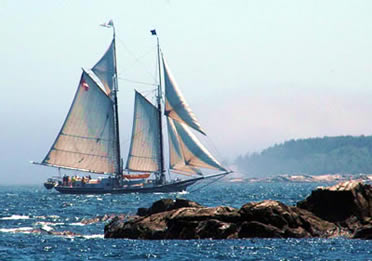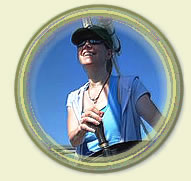Your dreams are already coming true.” ~Anon.

Photo by Ann Aronson, Lewis R French.
Garth Wells, owner and captain.
Favorite New England Adventures:
Mystic Aquarium and Institute for Exploration: Home of Robert Ballard, Adventurer and Explorer of the seven seas!
Mystic Seaport: Museum of America and the sea!
Birch Mountain Pottery
Explore the world of Davy Crockett and Miss Sally Ann!
A bibliography on the legend, tall tales and the real Davy Crockett, at The Resources for Readers and Teachers of Appalachian Literature for Children and Young Adults, compiled by Tina Hanlon, Ferrum College.
The Real Story about the man.
“Be always sure you are right, then go ahead.” ~From: A Narrative of the Life of David Crockett (1834)
From PBS: More information about the man.
“Every single word is true, unless it is false." ~From the Crockett Almanacs
The Crockett Almanacs & the Myth of the West Exhibit at the Mercantile Library, University of Missouri, St. Louis, highlights THE CROCKETT ALMANACS as among the "one hundred influential books printed before 1900" for their role in the development of American folklore and the myth of western frontier life.
Nineteenth Century American Children and What They Read: Some of Their Books.
Explore these New England Authors
Mark Twain House: www.marktwainhouse.org. In addition to tours of Mark Twain's home, The Mark Twain House & Museum offers a wide range of educational programs including lectures by major authors and artists, symposia, dramatic performances, concerts and "family friendly" activities.
Harriet Beecher Stowe: www.harrietbeecherstowecenter.org
Walt Whitman: www.waltwhitman.org
Emily Dickinson: www.emilydickinsonmuseum.org
Robert Frost: robertfrostfarm.org
Washington Irving: www.washingtonirving.com/museum/
Henry David Thoreau and Walden's Pond: www.walden.org. The Walden Woods Project preserves the land, literature and legacy of Henry David Thoreau to foster an ethic of environmental stewardship and social responsibility.
Ralph Waldo Emerson : www.rwe.org/emersonhouse/. Considered perhaps America’s best known thinker, Emerson led a renaissance in American ideas in the 19th Century: a search to realize the high potential of the individual person, to understand the proper role of the individual in society, and to discover and celebrate the interrelation and sacredness of all life. He was both a pragmatist and an idealist, a prolific writer and a poet.
Edgar Allen Poe: www.poemuseum.org. From Richmond, VA. But we New Englanders love him anyway.
It is from experiences such as mine that we get our education of life. We string them into jewels or into tinware, as we may choose. ~ Mark Twain, a Biography
Bruce Black, writer, editor of children's books, and writing instructor, engages in metaphors of swimming, and seas, as he explores the writing process. Come dive into a sea of words and swim toward a new understanding of the writing process: wordswimmer.blogspot.com/
Susan Taylor Brown writes, “There are so many stories only you can tell. Tell them, please.” Reading her LiveJournal is like taking a class in inspiration, persistence, and motivation, even as we follow the adventures of a dog named Cassie. A motivational speaker, writing instructor, workshop leader and full-time follower of dreams, she is found at susanwrites.livejournal.com.
Cheryl Klein is senior editor at Arthur Levine/Scholastic Books. Her website, Talking Books, offers insights into the writing process from the editor's perspective. Her articles on perspective, plot and engaging the reader are required reading for my class.
Monica Kulling: Canadian writer extraordinaire!
Hazel Mitchell, children's book illustrator and Wacky Brit!
Pixel Shavings, a group of children's illustrator/authors who glog together, and demonstrate the magic of children's book illustration!
Six top-notched children's book authors with many years of teaching experience (teaching to children, teens, and adults) share their expertise as writing teachers who are also working writers. Regular features include writing exercises, teaching tips, author interviews, book reviews, and answers to "Ask the Teaching Authors" questions at www.teachingauthors.com/
Cynthia Leitich Smith, at www.cynthialeitichsmith.com, has been recognized among Great Web Sites For Kids by the American Library Association (in the “Authors & Illustrators” category), and listed among “Useful Online Resources” in the CHILDREN'S WRITER'S AND ILLUSTRATOR'S MARKET by Alice Pope (Writers Digest, 2007).
Anastasia Suen writes, teaches and reviews children’s literature. Her website offers valuable resources for parents, librarians, writers and publishers. She also writes and maintains several blogs at: www.asuen.com/
Harold Underdown, a children’s book editor as well as the author of the Complete Idiot's Guide to Publishing Children's Book, maintains a comprehensive site about the writing and publishing of children's literature at underdown.org.
My alma mater, making dreams come true! The Vermont College of Fine Arts (VCFA) MFA in Writing for Children & Young Adults Program (Montpelier, VT) was the nation's first fully developed MFA program focusing on writing for young readers. Established in 1997, it has quickly attracted the attention of accomplished writers and publishers around the country.
My first alma mater: The Center for the Study of Children's Literature (CSCL) at Simmons College (Boston) administers the nation’s first Master of Arts in Children’s Literature
Children's Literature Network, your independent connection to the world of children's literature and teens. Cited by the ALA as one of the great web sites!
Kid's Book Revisions, a partnership between children's book editors Eileen Robinson and Harold Underdown, offers an 8 week online manuscript revision class. For more information, write them at kidsbookrevisions.com.
Stories and Resources provides information and advice to all who are interested in storytelling, including: Storytellers, Listeners, Researchers, and Educationalists. They offer a particularly interesting resource on Folktales and Fairy Tales.
Online Opportunities for Young Writers
A very interesting activity for high school students to create their own folktale, written by P. Arinto and F. Tanggaan, at this link.
Society for Children's Book Writer's and Illustrators is the only international organization to offer a variety of services to people who write, illustrate, or share an interest in children’s literature.
The Author's Guild has been the published writer's advocate for effective copyright, fair contracts, and free expression since 1912.
Esme Codell, a professional readiologist™ who thinks children's trade literature is the best hope for equalizing education in America: planetesme.com/, www.planetesme.com/fun.html and sister site, www.planetesme.blogspot.com/


